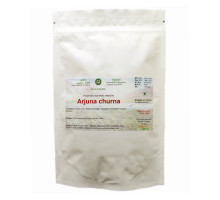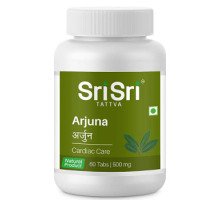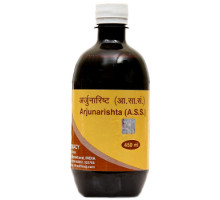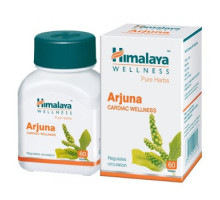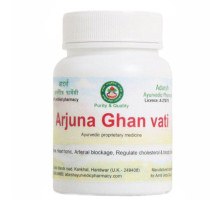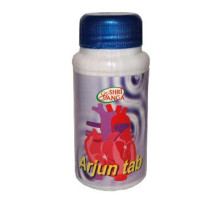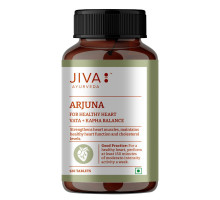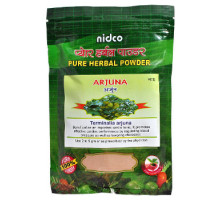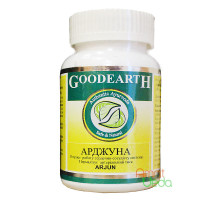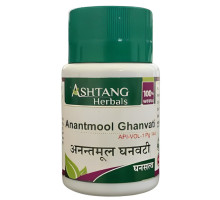Arjuna (Latin name for Terminalia arjuna) is a medicinal herb that is mainly used for heart disease because of its cardioprotective and cardio-strengthening properties. It strengthens the heart muscle and normalizes (mainly reduces) the heartbeat. It is also a good source of minerals that helps prevent osteoporosis and improve bone mineral density. Arjuna is used to treat ulcers, especially in peptic ulcer disease. It stops bleeding, therefore it is useful for bleeding disorders. Arjuna also reduces the frequency of urination, therefore it is useful for polyuria and frequent urination.
Terminalia arjuna improves the function of the left ventricle of the heart. It strengthens the heart muscles and improves the heart's ability to pump blood. Arjuna has a cardioprotective effect that helps maintain optimal heart function and accelerates the recovery process from heart injury. It is most commonly used to prevent myocardial infarction because it has antiatherogenic properties, which helps reduce plaque build-up in coronary arteries and improves blood flow to heart tissue.
Terminalia arjuna is also beneficial for people with myocardial ischemia, in which blood flow is reduced to the heart. It improves blood flow to the heart and reduces blockages in the coronary arteries. In addition, its tonic effect on the heart improves the tone and strength of the heart muscle and thus improves the heart's ability to pump blood efficiently and increase the left ventricular ejection fraction in people with heart disease. Plus, it has antioxidant properties, which also helps support cardiovascular health.
In Ayurveda, Arjuna is generally recommended for the prevention of heart disease in people with diabetes and hypertension.
Terminalia arjuna has antiatherogenic and hypolipidemic properties. It also reduces mild inflammation of the blood vessels, and its antihyperlipidemic action lowers the concentration of total cholesterol, LDL cholesterol, total VLDL cholesterol and triglycerides in serum. It also reduces the atherogenic index. A study in rabbits showed a decrease in atherosclerotic lesions of the rabbit aorta. These effects are likely related to its antihyperlipidemic, anti-inflammatory and antioxidant properties.
Thus, Arjuna's cortex can be used for its antiatherogenic action, reducing atherosclerotic lesions and stopping the progression of atherosclerosis.
Terminalia arjuna reduces the manifestations of heart failure. Increases the left ventricular stroke volume index and left ventricular ejection fraction. Research has shown that it helps improve exercise performance and effort tolerance.
Terminalia arjuna bark extract improves cardiac output and cardiac contractility index. It prevents and reduces heart dysfunction and helps recover from myocardial injury in congestive heart failure, in a rat study. In addition, research has shown that Arjuna bark inhibits lipid peroxidation and acts as an antioxidant.
In Ayurveda, Arjuna bark is mainly used for heart disease and as a heart tonic. In addition, it is also indicated for other diseases listed above. Now Arjuna is also being studied for the treatment of ulcers, diabetes and cancer.
Coronary artery disease is a common cause of heart failure in addition to uncontrolled hypertension. Terminalia arjuna helps stop its progression and further plaque build-up by reducing mild inflammation in blood vessels and coronary arteries. In addition, it also reduces cholesterol deposits and plaque formation. Significantly reduces the level of cholesterol, triglycerides, low density lipoproteins and the atherogenic index in the blood serum.
Research has shown the preventive value of Arjuna Terminalia in the treatment of myocardial infarction and myocardial ischemia, as it increases the amount of endogenous antioxidants in the heart tissue, which protects the heart from injury or myocardial injury.
Terminalia arjuna significantly reduces ischemic mitral regurgitation (IMR) and the incidence of angina pectoris. It also improves the E / A ratio, which indicates improved left ventricular function after using Arjuna's cortex for 3 months.
Narrow coronary arteries reduce the supply of oxygen to the heart, which can lead to shortness of breath. As discussed above, Arjuna Terminalia reduces vasoconstriction by treating mild inflammation and reducing plaque build-up in blood vessels, so it also helps treat breathing problems in heart patients. It should be used in combination with other herbs for good results.
Arjuna bark powder has antianginal and cardioprotective effects. Research has shown that it is significantly effective for stable angina pectoris. However, its results in unstable angina pectoris are limited, and in such cases it does not reduce the incidence of angina pectoris. Arjuna lowers systolic blood pressure and significantly increases good cholesterol levels. There are no side effects from the kidneys and liver. Thus, Terminalia Arjuna can be successfully used for stable angina pectoris.
In Ayurveda, Terminalia arjuna is always recommended as a heart tonic to improve cardiovascular endurance and function in cases of high blood pressure. However, when used alone, it may not provide significant control over high blood pressure. Therefore, combination therapy is recommended and beneficial depending on the underlying causes of hypertension.
In addition, it prevents narrowing of blood vessels by reducing atherosclerotic lesions and plaque build-up in blood vessels, as well as lowering cholesterol and elevated blood lipids, and treating dyslipidemia. Therefore, its long-term use is beneficial in the treatment of high blood pressure caused by atherosclerosis or vasoconstriction, or when hypertension is associated with high cholesterol or dyslipidemia.
Bark Terminalia arjuna has antihyperlipidemic and antioxidant effects, which helps to reduce serum cholesterol, triglycerides, LDL lipoproteins, VLDL lipoproteins and the atherogenic index. These effects can be caused by phytochemicals such as tannins, saponins, and flavonoids present in Arjuna's bark.
The astringents in Arjuna's bark have anti-hemorrhagic properties, which may be due to the fact that they can cause vasoconstriction, which helps reduce bleeding and heal hemorrhages. It is commonly used in Ayurveda for bleeding disorders along with other herbs.
In Ayurveda, Arjuna bark paste is prepared with water and applied to the fracture portion of the bone after alignment. The application of bark powder is repeated twice a day until recovery.
A decoction of the bark of Terminalia arjuna is used to wash wounds and skin ulcers. It kills germs, especially several strains of bacteria, and promotes wound healing.
Arjuna bark powder and its aqueous extract are very safe for ulcers, and their protective effect is comparable to that of ranitidine.
MEDICINAL PARTS
The inner part of the bark is the main medicinal part that is used for therapeutic purposes. It is known for its cardioprotective effects.
CHEMICAL COMPOSITION
The bark of Terminalia arjuna contains calcium and magnesium; Phenolic compounds - terminal acid and arjunolic acid; Glycosides: arjunetin and arjunosides I - IV; Flavones; Tannins; Oligomeric proanthocyanidins - B-sitosterol, Casuarinin; Phenolic acids: ellagic acid and gallic acid; Lactones.
PHARMACHOLOGIC EFFECT
Bark Terminalia arjuna plays a cardioprotective role in improving myocardial function. According to Ayurveda, Arjuna's bark strengthens the heart and myocardium (heart muscles), improves blood circulation in the heart tissue and improves its ability to pump blood. These facts are now also supported by some research.
INDICATIONS FOR USE
Dyslipidemia
Cardiac ischemia
Heart failure
Hypercholesterolemia
Angina pectoris
Arrhythmia (especially used for tachycardia)
Hemorrhage
Swelling due to heart disease
Asthma
Cough associated with weakness and fatigue
Heartburn, Gastritis, Peptic Ulcers
Dysentery
Bleeding hemorrhoids
Burning sensation when urinating, Urinary tract infections
Metrorrhagia (profuse uterine bleeding)
Obesity
Bone fractures, Low bone mineral density, Osteoporosis
Chronic low-grade fever associated with fatigue and weakness
General weakness and fatigue
DOSAGE
Terminalia arjuna can be used in various forms and in the following dosages:
Dosage of Arjuna Terminalia Bark Powder (Arjuna Churna):
Children: 1 to 3 grams
Adults: 3 to 6 grams
Maximum possible dosage: 24 grams per day (in divided doses)
Best time to take: 2 hours after eating
Dosage of Arjuna bark decoction:
Children: 25 to 50 ml
Adults: 50 to 100 ml
Maximum possible dosage: 200 ml per day (in divided doses) **
Best time to take: on an empty stomach in the morning and late afternoon or early evening, or 30 minutes before meals, or 2 hours after meals.
Dosage of Arjuna Bark Extract (Arjuna Ghan):
Children: 125 to 250 mg
Adults: 250 to 500 mg
Maximum possible dosage: 1500 mg per day (in divided doses)
Best time to take: on an empty stomach in the morning and late afternoon or early evening, or 2 hours after eating.
CONTRAINDICATIONS / WARNINGS
The bark of Terminalia arjuna is used in various forms such as bark juice, powder, decoction, etc. All of Arjuna's formulations are largely safe and well tolerated by most people when taken at the recommended dosage under the supervision of an Ayurvedic physician.
According to a study in rats, no oral toxicity was found when taken with 2 grams / kg of ethanolic arjuna extract.
According to clinical studies, Terminalia Arjuna powder is probably safe at the recommended dosage. It does not have a harmful effect on the function of the kidneys and liver.
Long-term intake of Arjuna bark powder has no side effects and is probably safe for the kidneys and liver. There were no significant changes in hematological parameters.
No side effects were observed with Terminalia Arjuna.
The safety profile of Arjuna Terminalia for pregnant women has not been studied. However, Arjuna may be safe in its natural form, but its derivatives and extracts are not recommended during pregnancy. You should also consult with your Ayurvedic doctor before taking Arjuna's medications during pregnancy.
Terminalia arjuna may be safe for breastfeeding mothers. No side effects of Arjuna have been reported for nursing mothers and infants.
You can read more about the properties and clinical trials here.

